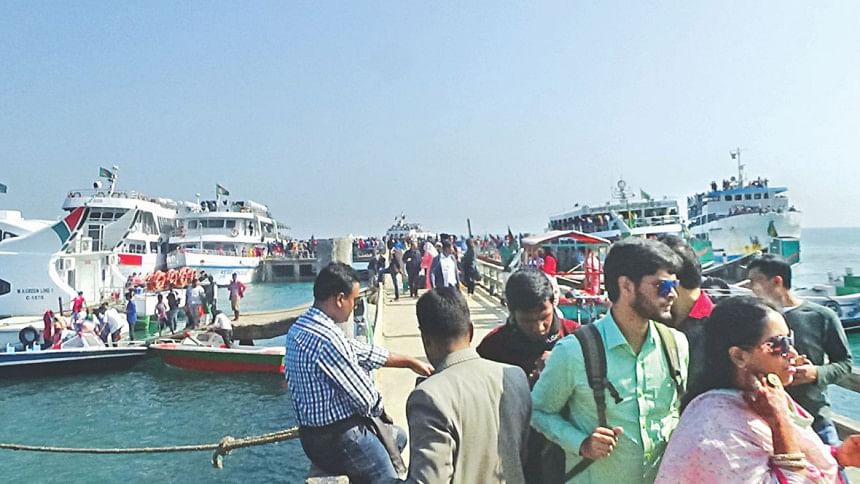Looking for a vacation spot? St Martin’s is not it.

Over the past year or so, my Facebook feed has been flooded with posts of people visiting St Martin's Island. The island now hosts multiple resorts, hotels, and various accommodations for its daily influx of tourists and holidaymakers from all across the country, drawn by its clear waters with corals submerged underneath.
Simultaneously, in a course of mine, I was learning about our country's Ecologically Critical Areas. On gaining ECA status, such areas need to be strictly restricted from any sort of human intervention while it recovers naturally; interference is only allowed in a scenario where the ecosystem cannot recover by itself. Coincidentally, St Martin's Island (also called Narikel Jinjira) was listed there, declared to be an Ecologically Critical Area all the way back in 1999!
On contemplating the two, my mind was frazzled with one question—how can we call this area an ECA whilst allowing humans to trample all over it? It turns out that due to external pressures, the island was forced to open up. The island's beauty fell captive to the money-hungry and is now treated like a gold mine—and just like a mine, it will soon be exhausted and left barren. Can we call it an ECA then? What will be left there for us to conserve or recover?
Section 5 of the Environment Conservation Act 1995 (last updated in 2010) states that once an area is threatened or damaged due to human activities, in the eyes of the government, it is to be given ECA status. They will then impose necessary restrictions in the area, which includes not letting any establishment or industry be developed that cause either land, air, water, or noise pollution. The Department of Environment also has the right to take necessary actions if the rules are violated in these areas.
The current hotels and establishments on the island have produced a considerable amount of waste to the point where clean-ups are being hosted every now and then to raise awareness. In January 2020, a clean-up programme hosted by the organisation Environment People picked up waste weighing a total of 200 kilogrammes. The next month, they went on to hand a nine-point memorandum to the Deputy Commissioner of Cox's Bazar demanding proper management of the area—including measures such as banning plastic use and tourism, and ensuring that all establishments built have obtained an Environmental Clearance Certificate.
They have all the volition and right to do so, since the effect of such waste is as clear as the light of day—it has led to the decline of coral species from 65 in the late 1990s to 41 in 2016. The plastic dumped in the water covers corals and this further aggravates their already vulnerable state as they are subjected to coral bleaching due to changing water and temperature conditions. Not to mention, tourist ships often collide with the corals, breaking them off and even injuring marine animals.
Such efforts were evidently ineffective since tourism activities in the country never slowed or improved sustainability practices. During the 10th Annual International Cleanup in Keokradong, Bandarban in December 2020, around 800kgs of waste was collected—which was four times the amount picked up in January. Yet, tourists kept flooding into St Martin's—surpassing the 1,250 limit a day—with almost 4,000 people visiting the island daily. This was only put to a halt recently this April due to rising Covid-19 cases in the area. Keep in mind dear reader, that it took a global pandemic to close the area to tourists, not the degrading environment.
My heart sinks at the thought of no one caring about such a national treasure and its exotic marine life and beautiful coral reefs. However, after searching on the web, I came across numerous articles stating the actions taken by Bangladesh Environmental Lawyers Association (BELA) in 2017. Through a survey, they came up with a hefty list of 104 illegal hotel and restaurant establishments on the island. They even filed a writ petition in 2009, under which the High Court appointed officials to mark all illegal establishments within a 60-day period. But those actions end there. The island's union parishad chairman has failed to remove such illegal structures due to external pressures preventing him from doing so. A rather disheartening end to such promising efforts.
Many may argue that such tourism is beneficial for the area's economy but reality is far from it. The locals, who number around 10,000, have been complaining about the price hikes due to the tourist industry boom which has compromised and deterred their own livelihoods. Gone are the days when they could simply fish and make a living undisturbed.
The degrading environment of the island cannot speak for itself. It needs a persistent voice and proper representation. There is still time to take the necessary steps for the area to live up to its label as an Ecologically Critical Area. The government should exercise its maximum capacity to protect this area, as per the Environment Conservation Act 1995, and do this fragile ecosystem justice. But looking to the high-ups alone will not do. It is my humble urge to all readers to please tick off St Martin's Island from your holiday travel plans and do your part. This will hopefully demotivate illegal establishments there and lead to them shutting down. The land will go back to its people and the government can refocus their conservation efforts once more. Sounds like a happy ending to me.
Adiba Ahamed is currently pursuing an undergraduate degree in Environmental Science at North South University.

 For all latest news, follow The Daily Star's Google News channel.
For all latest news, follow The Daily Star's Google News channel. 



Comments